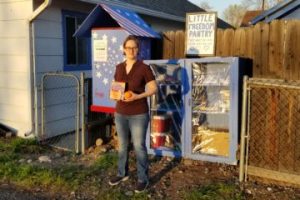Fight hunger and support grassroots charity
During these difficult times, governments should not outlaw private efforts to help those experiencing homelessness or food insecurity.
With so many out of work and struggling to provide for their families, city leaders should not discourage the kindness of neighbors. But government crackdowns on people trying to feed the hungry and help the homeless have become increasingly common. From shutting down food pantries to requiring expensive permits for charitable activity, policies designed to protect health and safety can end up denying opportunities to address vulnerable residents’ needs.

How are municipalities criminalizing helping the poor?
- Preventing food sharing: Local governments use a variety of regulatory tools to crack down on food sharing in the name of “health and safety.” This happens in cities across the country – from Clarkston, WA, where one woman is currently fighting for her right to share food with her neighbors through her little free pantry, to Kansas City, MO, where health department officials poured bleach onto food intended to be given to the homeless because the food was not prepared in a commercial kitchen.
- Overregulating food donated to homeless shelters: Cities often allow donations of food, but only boxed or canned food, which means that some people can never get fresh fruit, vegetables, or bread. NYC banned donations to homeless shelters of food that the city cannot assess the salt, fat and fiber content of to monitor the diets of those in the shelter.
- Using zoning laws to make it illegal to shelter the homeless on private property: Zoning codes across the country should accommodate the needs of people that are being creative with their property in an attempt to serve the homeless. In Akron, OH, Sage Lewis attempted to create a safe haven for the city’s homeless on his commercial property. Unfortunately, the city deemed providing private outdoor space for the homeless illegal under city zoning laws.
Residents should be allowed to serve their neighbors in need without being handicapped by local regulations. Below are strategies your city can pursue to ensure that the community can serve their most vulnerable.
To fight hunger and support grassroots charity, cities should:
- Allow people to donate and share food without permits. If permits to food share are necessary, keep them affordable and easy to obtain.
- Remove rules that overregulate the nutrition of donated food. Cities should not let perfectly good food go to waste when so many are hungry.
- Reform zoning codes to allow adaptability when a community member finds a new, innovative method for serving their community.
Let’s get to work in your city.
Please fill out this form and an IJ staff member will reach out to you shortly.
